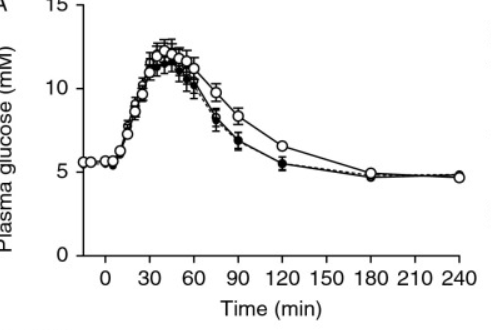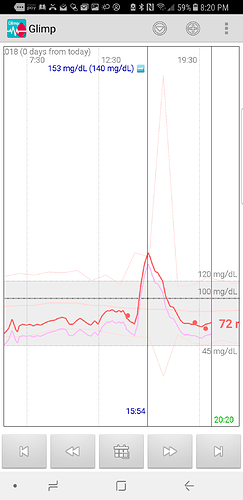Hi! I want to share a personal victory - I believe I’ve proven I’ve achieved normal insulin sensitivity. I wasn’t sure. In the diabetic support communities they say you can achieve normal a1c with keto and you can reverse some damage but your beta cells will always be damaged, you’ll always struggle with insulin resistance… Well, I was diagnosed with t2 diabetes 4 years ago, with an a1c of 12.1 (blood glucose average around 300) & kidney damage. At the time I was obese (245ish) & up until then, relatively content with that. I spent a year following standard ADA advice, then woke up, did my own research on diabetes. Since then I’ve tried to read and listen to everything - Dr Bernstein, Fung, Phinney & Volek, even the vegan stuff (tried it briefly, not for me), 2kd of course, KetoGains, ON, etc. Through keto I lost most of the weight, got off all the meds and got my a1c down to the mid 5s. I wanted to push my health further though so pursued healing my insulin resistance through intermittent fasting & then specifically the Impulsive Keto form of 2 meals a day with occasional skip-days and minimal added fats.
The question on my mind is, am I still insulin resistant? There are various ways of testing - waist/height ratio? 33/64 puts me right on the edge. HOMA-IR, based on fasting insulin to fasting glucose? 2.5 iIU/ml x 85 mg/dl put me at 0.5, as good as it gets – maximally insulin sensitive but maybe that was just because as a long-term ketoer my insulin and glucose are low in general. The McAuley index (based on trigs & fasting insulin)? Again, maybe my insulin is superlow because of keto or because as I recently discovered I’m hypothyroid, but my trigs are also low so the McAuley Index says I’m good to go, if I can trust that, but maybe because of keto I can’t. There’s the oral glucose tolerance test (OGTT) but it’s said not to work on ketoers because even healthy nondiabetic ketoers often develop physiological insulin resistance & aren’t metabolically flexible enough to handle a big glucose load, or so they say.
I figured the only valid way to tell is to try a carb-load and see what happens. It’s been 3+ years since I have even touched carbs. Diabetes = early ugly death and as its preached in the diabetes support groups inspired by Dr Bernstein, strict adherence to keto is how you keep your glucose low & safe. Carbs = death. But if Fung’s right that fasting can heal insulin resistance, or if the weight I’ve lost has cleared out enough room in my adipocytes that I’ve become truly insulin sensitive again, and if I’ve lost enough visceral fat that my pancreas functions normally, and if my poor abused beta cells have recovered enough to function normally… If all these things have happened then maybe I have completely reversed my diabetes… even cured it, if the word “cure” can be used in this context.
I ate the forbidden sweet potato for lunch Saturday. 300g, so 50g carbs. On my continuous glucose meter, my glucose spiked to 153 mg/dl after 45 mins then took 2h to subside back to 72 mg/dl.
Here’s the standard nondiabetic response to a 50g OGTT.

Looks like I actually spiked lower than the average nondiabetic, and cleared the glucose in exactly the average time. Totally normal if I interpret this right.
It’s taken many years to get to this point. I’m not going back to eating processed food, but I am ecstatic that it seems I’ve healed enough to handle whole food carbohydrates normally, at least occasionally. Very grateful to the Impulsive Keto model which is a simple, minimal added fat/whole foods diet, meal timing, informed supplements and safe, short fasts, & @Karen <3





 And regular fasting is definitely crucial to the Impulsive Keto protocols. That’s where the name comes from - “I’m pulsing” my insulin.
And regular fasting is definitely crucial to the Impulsive Keto protocols. That’s where the name comes from - “I’m pulsing” my insulin. As the lucky owner of a continuous glucose monitor and a fitbit, I tell you, if I am sedentary for as little as an hour I see it reflected on both devices. I’m not saying you need to do weight lifting (although many people DO say that and maybe they’re on to something) but sitting = death. I really hate the gym but I have a treadmill desk (typing on it right now in fact) and a garden and there’s always housework to do if it’s raining and I don’t feel like hittin the treadmill.
As the lucky owner of a continuous glucose monitor and a fitbit, I tell you, if I am sedentary for as little as an hour I see it reflected on both devices. I’m not saying you need to do weight lifting (although many people DO say that and maybe they’re on to something) but sitting = death. I really hate the gym but I have a treadmill desk (typing on it right now in fact) and a garden and there’s always housework to do if it’s raining and I don’t feel like hittin the treadmill.